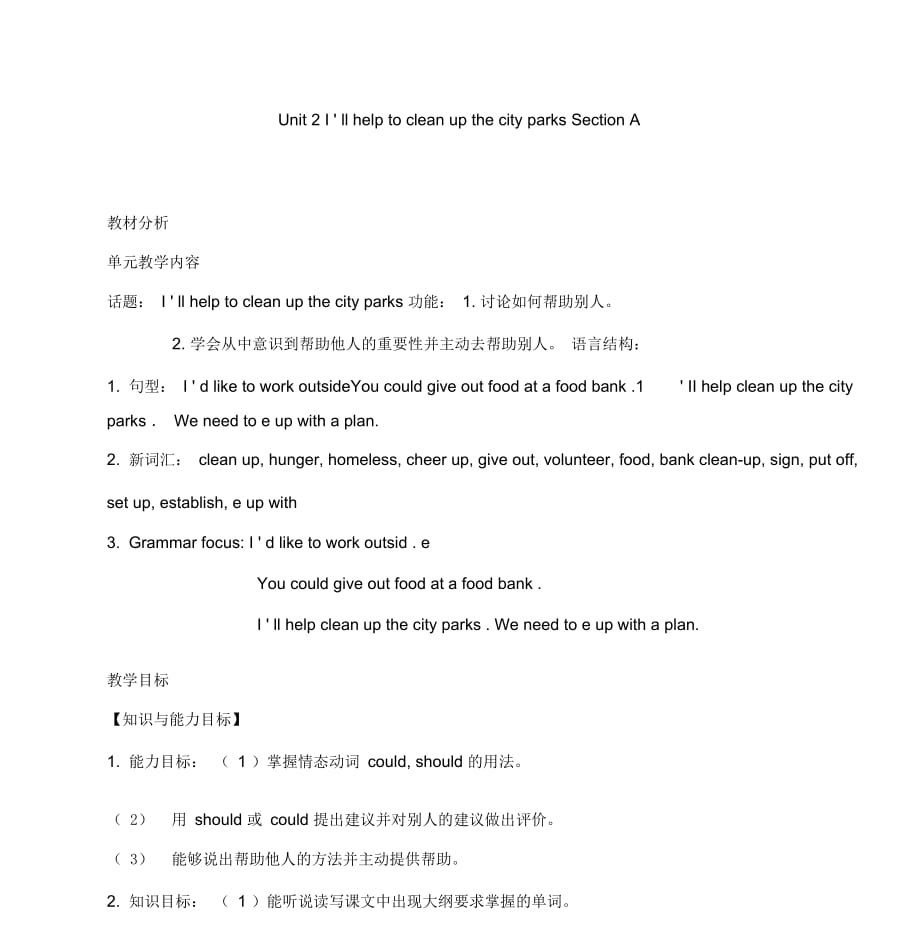《人教新目標(biāo)GoForIt!(2012)初中英語(yǔ)八年級(jí)下冊(cè)Unit2ISectionA教案(三)》由會(huì)員分享�����,可在線閱讀�����,更多相關(guān)《人教新目標(biāo)GoForIt!(2012)初中英語(yǔ)八年級(jí)下冊(cè)Unit2ISectionA教案(三)(8頁(yè)珍藏版)》請(qǐng)?jiān)谘b配圖網(wǎng)上搜索�����。
1�����、精品文檔
Unit 2 I ll help to clean up the city parks Section A
教材分析
單元教學(xué)內(nèi)容
話題: I ll help to clean up the city parks 功能: 1. 討論如何幫助別人�����。
2. 學(xué)會(huì)從中意識(shí)到幫助他人的重要性并主動(dòng)去幫助別人�����。 語(yǔ)言結(jié)構(gòu):
1. 句型: I d like to work outsideYou could give out food at a food bank .1 II help clean up the city
parks . We need to e up w
2、ith a plan.
2. 新詞匯: clean up, hunger, homeless, cheer up, give out, volunteer, food, bank clean-up, sign, put off, set up, establish, e up with
3. Grammar focus: I d like to work outsid . e
You could give out food at a food bank .
I ll help clean up the city parks . We need to e up with a plan
3�����、.
教學(xué)目標(biāo)
【知識(shí)與能力目標(biāo)】
1. 能力目標(biāo): ( 1 )掌握情態(tài)動(dòng)詞 could, should 的用法�����。
( 2) 用 should 或 could 提出建議并對(duì)別人的建議做出評(píng)價(jià)�����。
( 3) 能夠說(shuō)出幫助他人的方法并主動(dòng)提供幫助�����。
2. 知識(shí)目標(biāo): ( 1 )能聽(tīng)說(shuō)讀寫(xiě)課文中出現(xiàn)大綱要求掌握的單詞�����。
( 2) 要知道“ would like to do 以及 can/could 等情態(tài)動(dòng)詞�����。
( 3) 掌握詢問(wèn)別人可以提供什么幫助的方法
【過(guò)程與方法目標(biāo)】
直觀教學(xué)法�����、情景教學(xué)�����、任務(wù)型教學(xué)法�����。
【情感態(tài)度價(jià)值觀目標(biāo)】�
1. 在授課過(guò)程中滲透助人就是助己�����,助人
4�����、收獲快樂(lè)的情感目標(biāo)�����。
2. 使學(xué)生在談?wù)撊绾螢閯e人提供幫助的對(duì)話中能意識(shí)到盡己所能�����,幫助他人,樂(lè)于奉 獻(xiàn)是一種良好的 品德�����。
3. 培養(yǎng)學(xué)生為他人著想�����,熱愛(ài)公益事業(yè)�����,樂(lè)于助人的優(yōu)良品質(zhì)�����。
教學(xué)重難點(diǎn)
【教學(xué)重點(diǎn)】
1. 情態(tài)動(dòng)詞 could 如何表達(dá)建議�����;
2. 正確使用有關(guān)援助的表述�����、動(dòng)詞短語(yǔ)以及相關(guān)表達(dá)中的動(dòng)詞不定式�����。
【教學(xué)難點(diǎn)】
正確使用有關(guān)援助的表述�����。
課前準(zhǔn)備
Multimedia �����、多媒體設(shè)備�����、電腦�����、現(xiàn)實(shí)生活中及卡通圖片
教學(xué)過(guò)程
一�����、創(chuàng)設(shè)情境
1. Asking questions “ Who are they?
(Volunteers) ” , “
5�����、 What are they doing? (They are
sweeping our school.) ” Let them answer the questions according to the picture.
2. Ask students “ Do you want toabveolunteer to solve the problems? ”
Look at these pictures, there are many ways to help people
二、啟發(fā)思考
1. Ask student to look at the pic of 1a and thi
6�����、nk about it.
2. And ask some students to share their opinion and ment them
3. Show them the other answers on PPT and encourage them to give more answers.
三�����、自主或小組探究
1. Review the new words in 2a and 2b again,and check the answer and what they
how
just listened again.
2. Read the sample convers
7�����、ations on 2c, students work in pair and practice the words about
htoelp people
3. And encourage students to make the dialog longer than the book and think the ways to help others as much as possible.
四�����、協(xié)作交流
1. Say the sample conversations. Have students repeat. Then ask students to practice the
8�����、conversations in pairs. Ask them to use the vocabulary from the pic of beginning. As students work, listen in on various pairs so that you can check progress and help with pronunciation as needed.
2. After students have had a chance to practice the conversations, ask pairs to e to the front of the
9�����、room and act out one of their conversations.
Do some practice.
教學(xué)反思
在授課過(guò)程中除了教授學(xué)生必須掌握的只是之外�����,還要滲透助人就是助己�����,助人 收獲快樂(lè)的觀
念�����,使學(xué)生在談?wù)撊绾螢閯e人提供幫助的對(duì)話中能意識(shí)到盡己所能�����,幫 助他人是一個(gè)良好的品質(zhì)等�����。
Period 2
設(shè)計(jì)思路說(shuō)明
【創(chuàng)設(shè)情境】
1. 復(fù)習(xí)第一課時(shí)主要單詞�����、短語(yǔ)�����、句型?����?刹捎美蠋焼?wèn)學(xué)生答的方式�����。
2. 用提問(wèn)的方式引導(dǎo)學(xué)生回答問(wèn)題�����,練習(xí)句型:
- Do you want to be a volunteer?
- How could we hel
10�����、p others?
- We can help as a volunteer.
- We can plant the tree.
- We can help to clean.
【啟發(fā)思考】
帶領(lǐng)引導(dǎo)學(xué)生們精讀 3a �����,并完成 ppt 上的題目
【自主或小組探究】 老師提出以下問(wèn)題并引導(dǎo)學(xué)生以同桌或者小組的形式探究
1. Why do Mario and Mary volunteer to help others?
2. What do they say about volunteering? 老師根據(jù)前面學(xué)生討論結(jié)果�����,并做好疑點(diǎn)筆記�����,最后再進(jìn)行
歸納總結(jié)�����。 【協(xié)作交流】
11�����、根據(jù) 4a 給出的問(wèn)題�����,讓同桌或小組之間進(jìn)行討論并給出回答�����。 【總結(jié)提高】
通過(guò)習(xí)題以及語(yǔ)法知識(shí)�����,練習(xí)反饋所學(xué)知識(shí)
教材分析 單元教學(xué)內(nèi)容 話題: I ll help to clean up the city parks 功能: 1. 討論如何幫助別人�����。
2. 學(xué)會(huì)從中意識(shí)到幫助他人的重要性并主動(dòng)去幫助別人。 語(yǔ)言結(jié)構(gòu):
ll help clean
1. 句型 : I d like to work outsideYou could give out food at a food bank
up the city parks . We need to e up with a pl
12�����、an.
2. 新詞匯: put up �����, put off
3. 復(fù)習(xí)舊詞匯: clean up, hunger, homeless, cheer up, give out, volunteer
4. Grammar focus:How could we help others?
We can help them as a volunteer.
I d like to work outside
You could give out food at a food bank .
I ll help clean up the city parks . We need to e up
13�����、with a plan.
教學(xué)目標(biāo) 【知識(shí)與能力目標(biāo)】
1. 能力目標(biāo): ( 1 )掌握情態(tài)動(dòng)詞 could, should 的用法�����。
( 2) 用 should 或 could 提出建議并對(duì)別人的建議做出評(píng)價(jià)�����。
( 3) 能夠說(shuō)出幫助他人的方法并主動(dòng)提供幫助�����。
2. 知識(shí)目標(biāo): ( 1 )能聽(tīng)說(shuō)讀寫(xiě)課文中出現(xiàn)大綱要求掌握的單詞�����。
( 2)要知道“ would like to do 以及 can/could 等情態(tài)動(dòng)詞�����。
3)掌握詢問(wèn)別人可以提供什么幫助的方法
過(guò)程與方法目標(biāo)】 直觀教學(xué)法�����、情景教學(xué)�����、任務(wù)型教學(xué)法�����。
【情感態(tài)度價(jià)值觀目標(biāo)】
1. 在授課過(guò)程中滲透助人就是助己
14�����、�����,助人收獲快樂(lè)的情感目標(biāo)。
獻(xiàn)是一種良好的
2. 使學(xué)生在談?wù)撊绾螢閯e人提供幫助的對(duì)話中能意識(shí)到盡己所能�����,幫助他人�����,樂(lè)于奉 品德�����。
3. 培養(yǎng)學(xué)生為他人著想�����,熱愛(ài)公益事業(yè)�����,樂(lè)于助人的優(yōu)良品質(zhì)�����。
教學(xué)重難點(diǎn)
【教學(xué)重點(diǎn)】
1. 情態(tài)動(dòng)詞 could 如何表達(dá)建議�����;
2. 正確使用有關(guān)援助的表述�����、動(dòng)詞短語(yǔ)以及相關(guān)表達(dá)中的動(dòng)詞不定式�����。
【教學(xué)難點(diǎn)】 正確使用有關(guān)援助的表述�����。
課前準(zhǔn)備
Multimedia �����、多媒體設(shè)備�����、電腦�����、現(xiàn)實(shí)生活中及卡通圖片 教學(xué)過(guò)程
一、創(chuàng)設(shè)情境
1. Do you know the sentence “ Giving is better than r
15�����、eceiving ” ? Have you heard of
Uncle Lei Feng? He always volunteered his time to help other people. He gave out his money he saved to homeless persons, helped to fix up cars and so on. He set a good example for us.
Now look at these picture. What are they doing?
2. Answer “ They are help as a vol
16�����、unteer/help to plant the tree/help to clean ”
3. Train student to learn to give more suggestion on how to help others.
二�����、啟發(fā)思考
1. Lead students to read 3a firstly and let them ask some question that they don understand on the article.
2. To check if they understand the article totally give the qu
17�����、estions below and ask student to answer questions Do they true of false?
(1) Mario and Mary give up several hours each week to help others.
(2) Mary wants to be an animal doctor.
(3) Mario is a book lover.
(4) Mario could read by himself at the age of five.
三�����、自主或小組探究
1. After practicing and as
18�����、k student to think about question in3b,and talk the questions in pairs, each pair send one student to answer the question.
2. Teacher ment and find some mistakes during the answer to make them know this article and some grammar better.
四、協(xié)作交流
Ask students to check the vocabulary in blanks and talk with each other.
1. Learn some language points and do some practice.
2. Do homework.
教學(xué)反思
本單元出現(xiàn)了許多相關(guān)詞組如 put �����, give 相關(guān)詞組需要要求同學(xué)們進(jìn)行掌握背誦�����,并 盡
可能多的將其釋意給學(xué)生解釋清楚�����。同時(shí)要在課堂的基礎(chǔ)之上對(duì)學(xué)生在意識(shí)上加以引 導(dǎo)�����,要
求學(xué)生們能在生活中養(yǎng)成樂(lè)于助人的好習(xí)慣�����。
 人教新目標(biāo)GoForIt!(2012)初中英語(yǔ)八年級(jí)下冊(cè)Unit2ISectionA教案(三)
人教新目標(biāo)GoForIt!(2012)初中英語(yǔ)八年級(jí)下冊(cè)Unit2ISectionA教案(三)

